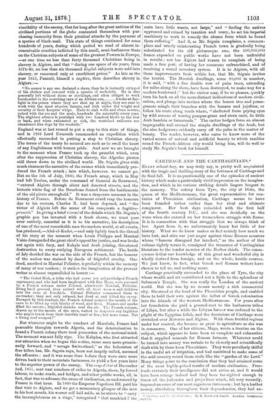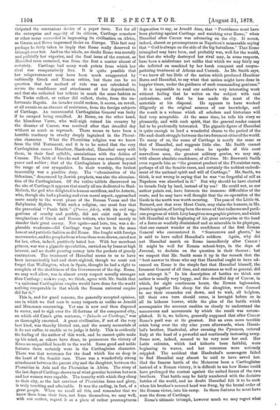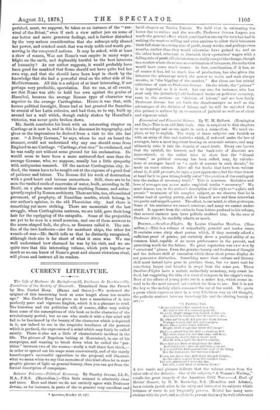ye and Me CarMayinfaas.
CARTHAGE AND THE CARTHAGINIANS.* EVERY school-boy, we may truly say, is pretty well acquainted
with the tragic and thrilling story of the fortunes of Carthage and its final fall. It is unquestionably one of the episodes of ancient history which make a particularly vivid impression on the imagina- tion, and which in its various striking details lingers longest in the memory. The colony from Tyre, the city of Dido, the queen of the Mediterranean, the great representative for cen- turies of Phceuician civilisation, Carthage seems to have been founded rather earlier than her rival and ultimate conqueror. Her best days coincided with the first half of the fourth century B.C., and she was decidedly on the wane when she entered on her tremendous struggle with Rome.
It is in connection with that struggle that we always think of her. Apart from it, we unfortunately know but little of her history. What we do know makes us feel acutely how much we
have lost, and stirs our just anger against those Roman senators whose "famous disregard for intellect," as the author of this volume rightly terms it, consigned the treasures of Carthaginian
literature to the tender mercies of the Berber chiefs. The conse- quence is that our knowledge of this great and wonderful city is wholly derived from foreign, and on the whole, hostile sources. We just know, in fact, what Greek and Roman writers have chosen to tell us, and nothing more.
Carthage practically succeeded to the place of Tyre, the city whose wealth and art contributed not a little to the splendour of Solomon's Temple. She was really the tondon of the ancient world. But she was by no means merely a rich commercial city. She stood at the head of the Phceuician people, and enabled them to hold their own against the influx of Greek colonisation into the islands of the western Mediterranean. For years after her foundation she paid a ground-rent to the barbarous tribes of Libya, but after a while the Libyan farmer was reduced to the plight of the Egyptian fellah, and the dominions of Carthage were stretched over Morocco and Algiers. With these fruitful regions under her control, she became as great in agriculture as she was in commerce. One of her citizens, DIago, wrote a treatise on the subject, which appears to have been so complete and exhaustive that it supplied manuals for Roman farmers. Whatever could be turned into money was certain to be cleverly and scientifically dealt with by those keen Phomicians. They were peculiarly skilful in the useful art of irrigation, and had contrived to make some of the arid country round them smile like the "garden of the Lord." Many things point to the conclusion that they had attained some of the most highly-prized results of modern civilisation. Free- trade certainly their intelligence did not arrive at, and it would have been strange indeed had they been far-sighted enough to throw off the jealousies and prejudices which, till very recently, Imposed on some of our most sagacious statesmen ; but by a leather money, circulating throughout their dependencies, they had an-
By It. Bosworth Smith. London: Longmans
ticipated the convenient device of a paper issue. Yet for all the enterprise and sagacity of its citizens, Carthage somehow or other never succeeded in impressing its civilisation on Africa, as Greece and Rome impressed theirs on Europe. This fact may perhaps be fairly taken to imply that Rome really deserved to triumph over her. And on the whole, no doubt Rome was morally and politially her superior, and the final issue of the contest, as Hannibal soon surmised, was from the first a matter almost of certainty. Carthage had many weak points from which her rival was comparatively free. It is quite possible that her misgovernment may have been much exaggerated by unfriendly Greek and Roman critics, but there can be no question that •her method of rule was not calculated to secure the confidence and attachment of her dependencies, and that she collected her tribute in much the same fashion as the Turks collect, or rather did collect, theirs, from the un- fortunate Rayahs. An invader could reckon, it seems, on revolt, at all events on an absence of resistance, from the foreign subjects of Carthage. An unsuccessful Carthaginian General was lucky if he escaped being crucified. At Rome, on the other hand, the blunderer Varro, who well-nigh ruined his country by the disaster of Cannm, was received after that dreadful day without so much as reproach. There seems to have been a horrible tendency to cruelty deeply ingrained in the Phoeni- cian character. What the Phoenician religion was we know from the Old Testament, and it is to be noted that the very Carthaginian names Hamilcar, Hasdrnbal, Hannibal carry with them, in their final syllable, associations with the deities of Canaan. The faith of Greeks and Romans was something much purer and nobler ; that of the Carthaginians is almost beyond the range of our sympathies. In their worship, the foulest immorality was a positive duty. The "abomination of the Sidonians," denounced by Jewish prophets, was also the abomina- tion of the Carthaginians. Of the votive tablets discovered on the site of Carthage it appears that nearly all are dedicated to Baal- Moloch, the god who delighted inhuman sacrifices, and to Astarte, who, though she had a pleasing and even moral aspect, approached more nearly to the worst phase of the Roman Venus and the Babylonian Mylitta. With such a religion, one must fear that the proverbial "Punic faith" (Punka fides), with its evil sug- gestions of cruelty and perfidy, did not exist only in the imaginations of Greek and Roman writers, who loved merely to slander their great enemy. Nor again—and here, too, was a de- plorable weakness—did Carthage wage her wars in the same honest and patriotic fashion as did Rome. She fought with foreign mercenaries, and the peoples from whom these were drawn, cared not for her, often, indeed, positively hated her. With her merchant princes, war was a gigantic speculation, carried on by loans at high interest, and no doubt pouring money into the pockets of greedy contractors. The treatment of Hannibal seems to us to have been inconceivably bad and short-sighted, though we must not forget that Wellington, when in Spain, thought he had a right to complain of the shabbiness of the Government of the day. Rome, we may well allow, was in almost every respect morally stronger than Carthage ; and.we may, we think, agree with Mr. Smith that "a universal Carthaginian empire would have done for the world nothing comparable to that which the Roman universal empire did for it."
This is, and for good reasons, the generally accepted opinion, one in which we find men in many respects as unlike as Arnold and Mommsen concurring. Yet one is now and then disposed to waver, and to sigh over the ill-fortune of the conquered city, on which old Cato's grim sentence, " Deleada est Carthago," was so thoroughly executed. A great civilisation, if not of the very best kind, was thereby blotted out, and the scanty memorials of it do not suffice to enable us to judge it fairly. This is evidently the feeling of the author of this work, and he cannot quite make up his mind, as others have done, to pronounce the victory of Rome an unqualified benefit to the world. Some good and noble features there certainly were in the Carthaginian character. There was that reverence for the dead which lies so deep in the heart of the Semitic race. There was a wonderfully strong attachment between the parent city and the daughter, between the Phoenician in Asia and the Phoenician in Africa. The story of the last days of Carthage shows us of what genuine heroism her men and her women were capable. The tenacity with which they clung to their city, as the last survivor of Phoenician fame and glory, is truly touching and admirable. It was the ending, in fact, of a great people. When we recall all this, and remember that we know them from their foes, not from themselves, we may well, with our author, regard it as a piece of rather presumptuous dogmatism to say, as Arnold does, that "Providence must have been plotting against Carthage and watching over Rome," when Hannibal after Cannse was advancing on the city. It seems, indeed, almost as presumptuous as Napoleon's memorable saying that "God is always on the side of the big battalions." That Rome triumphed may have been, and probably was, well for the world, but that she wholly destroyed her rival may, in some respects, have been a misfortune not unlike that which we may fairly say she inflicted on mankind by her harsh conquest and unsym- pathising treatment of Athens and Corinth. As Mr. Smith says, "we know all too little of the nation which produced Hamilcar Barca and Hannibal, to say what that nation might have done in happier times, under the guidance of such commanding geniuses."
It is impossible to read our author's very interesting work without feeling that he writes on the subject with real enthusiasm, and that he has made the most of the
materials at his disposal. He appears to have worked diligently at the original sources of our knowledge, and the result is a volume which all scholars and historians will find very acceptable. At the same time, he tells his story so pleasantly, and with such spirit, that the general reader cannot fail to be profoundly interested. The gigantic figure of Hannibal is quite enough to lend a wonderful charm to the period of the life-and-death struggle between the two foremost cities of the world. To many of us, the name of Carthage is nearly the same as that of Hannibal, and suggests little else. Mr. Smith cannot help becoming eloquent when he speaks of this most marvellous man, the greatest military genius, we may say, with almost absolute confidence, of all time. Mr. Bosworth Smith even regards him as "the greatest product of the Phoenician race, perhaps of all the Semitic races, and certainly the noblest embodi- ment of the national spirit and will of Carthage." Mr. Smith, we think, is not wrong in saying that he was "as forgetful of self as Napoleon was absorbed in it." But why should he have elected to invade Italy by land, instead of by sea? He could not, as our author points out, have foreseen the immense difficulties of the route, and he may have well thought that the co-operation of the Gauls in the north was worth securing. The pass of the Little St. Bernard, not that over Mont Cenis, may claim the honour, in Mr. Smith's opinion, of having been the scene of that toilsome and peril- ous progress of which Livy has given us a graphic picture, and whkh- left Hannibal at the beginning of his great enterprise at the head of a force so woefully diminished and so miserable in its physique, that one cannot wonder at the confidence of the first Roman General who encountered it. "Scarecrows and ghosts," he is said to have called Hannibal's soldiers. Again, why did not Hannibal march on Rome immediately after Cann It might be well for Roman school-boys, in the days of Juvenal, to declaim on the question in their themes ; but we suspect that Mr. Smith sums it up in the remark that the "best answer to those who say that Hannibal ought to have ad-. vanced on Rome is the simple fact that Hannibal himself, the foremost General of all time, and statesman as well as general, did not attempt it." In his description of battles we think our author is usually very happy, and the dreadful day of Cann, in which, for eight continuous hours, the Roman legionaries, penned together like sheep for the slaughter, were doomed to see their comrades cut down, and to wait, all helpless, till their own turn should come, is brought before us in all its hideous horror, while the plan of the battle which accompanies the account enables us clearly to understand the manoeuvres and movements by which the result was accom- plished. It is, we believe, generally supposed that after Canoe Rome's peril was at its greatest. But an even more terrible crisis hung over the city nine years afterwards, when Hanni- bal's brother, Hasdrubal, after crossing the Pyrenees, entered Italy at the head of a powerful and continually increasing army. Rome now, indeed, seemed to be very near her end. Her Latin colonies, which had hitherto been faithful, were beginning to waver, and her resources were seriously crippled. The accident that Hasdrubars messengers failed to find Hannibal may almost be said to have saved her. Had the famous battle of the Metaurus been a Carthaginian instead of a Roman victory, it is difficult to see how Rome could have prolonged the contest against the united forces of the two brothers. That battle may be fairly numbered with the decisive battles of the world, and no doubt Hannibal felt it to be such when his brother's severed head was flung, by the brutal order of the Roman victor, into his camp. In those features he must have seen the doom of Carthage.
Rome's ultimate triumph, however much we may regret what
perished, must, we suppose, be taken as an instance of the "sur- vival of the fittest," even if such a view rather jars on some of our better and more generous feelings, and is further disturbed by the very serious consideration that she subsequently abused her power, and crushed much that was truly noble and worth pre- serving in the conquered nations. It may be asked, with at least a show of reason, Was not Rome's vast empire in many ways a blight on the earth, and deplorably hurtful to the best interests of humanity? As our author suggests, it would probably have been good for mankind that Rome should not have quite had her own way, and that she should have been kept in check by the knowledge that she had a powerful rival on the other side of the Mediterranean. All this is a subject of at least interesting, if not perhaps very profitable, speculation. But we can, at all events, see that Rome was able to hold her own against the genius of Hannibal, because the average Roman type of character was superior to the average Carthaginian. Hence it was that, with keener political foresight, Rome had at last granted the franchise to several of her Latin colonies, and had thus, so to say, built up around her a wall which, though rudely shaken by Hannibal's victories, was never quite broken down.
Mr. Smith concludes his book with an interesting chapter on Carthage as it now is, and in this he discusses its topography, and gives us the impressions he derived from a visit to the site last year. "A lively German," he says, whom he met on board the steamer, could not understand why any one should come from England to see Carthage. "Carthage, c'est rien!" he exclaimed, and he was really not without some ground for his exclamation. He would seem to have been a more matter-of-fact man than the average German, who, we suppose, usually has a little sympathy with antiquarian research. Of the ancient Carthaginian city, in- deed, the traces have to be sought out at the expense of a good deal of patience and labour. The Roman did his work of destruction with a good heart and intense earnestness. Still, there are to be seen the vaulted roofs of reservoirs of water, built, according to M. Beule, on a plan more ancient than anything Roman, and subse- quently copied by Roman architects. There arebits, too, of tesselated pavement, of porphyry, of Numidian marble, which belong, in -our author's opinion, to the old Phcenician city. And there is something yet more striking. There are memorials of the last struggle, when Carthaginian matrons, we are told, gave their long hair for the equipping of the catapults. Some of the projectiles are yet to be seen in a small museum, and one of them answers to the acorn-shaped bolt, the glans, as Romans called it. The out- line of the two harbours—one for merchant ships, the other for vessels-of-war—Mr. Smith tells us that he distinctly recognised, although their size is far short of what it once was. We can well understand how charmed he was by his visit, and we are quite sure that this interesting volume, which puts together as much as we can know of Rome's great and almost victorious rival, will please and instruct all its readers.
































 Previous page
Previous page